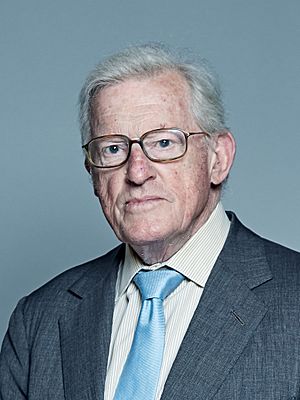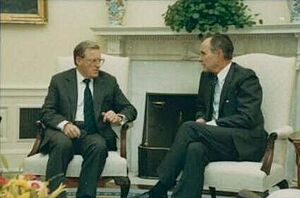Tom King, Baron King of Bridgwater facts for kids
Quick facts for kids
The Lord King of Bridgwater
|
|
|---|---|
 |
|
| Secretary of State for Defence | |
| In office 24 July 1989 – 11 April 1992 |
|
| Prime Minister | Margaret Thatcher John Major |
| Preceded by | George Younger |
| Succeeded by | Malcolm Rifkind |
| Secretary of State for Northern Ireland | |
| In office 3 September 1985 – 24 July 1989 |
|
| Prime Minister | Margaret Thatcher |
| Preceded by | Douglas Hurd |
| Succeeded by | Peter Brooke |
| Secretary of State for Employment | |
| In office 16 October 1983 – 2 September 1985 |
|
| Prime Minister | Margaret Thatcher |
| Preceded by | Norman Tebbit |
| Succeeded by | The Lord Young of Graffham |
| Secretary of State for Transport | |
| In office 11 June 1983 – 16 October 1983 |
|
| Prime Minister | Margaret Thatcher |
| Preceded by | David Howell |
| Succeeded by | Nicholas Ridley |
| Secretary of State for the Environment | |
| In office 6 January 1983 – 11 June 1983 |
|
| Prime Minister | Margaret Thatcher |
| Preceded by | Michael Heseltine |
| Succeeded by | Patrick Jenkin |
| Shadow Secretary of State for Energy | |
| In office 19 November 1976 – 4 May 1979 |
|
| Leader | Margaret Thatcher |
| Preceded by | John Biffen |
| Succeeded by | David Owen |
| Member of the House of Lords Lord Temporal |
|
| Assumed office 9 July 2001 Life Peerage |
|
| Member of Parliament for Bridgwater |
|
| In office 12 March 1970 – 14 May 2001 |
|
| Preceded by | Gerald Wills |
| Succeeded by | Ian Liddell-Grainger |
| Personal details | |
| Born | 13 June 1933 Rugby, Warwickshire, England |
| Political party | Conservative |
| Spouse | Elizabeth Jane King |
| Alma mater | Emmanuel College, Cambridge |
Thomas Jeremy King, Baron King of Bridgwater (born 13 June 1933) is a British politician. He was a very important member of the Conservative Party. He worked in the government's top team, called the Cabinet, from 1983 to 1992. He was also a Member of Parliament (MP) for Bridgwater in Somerset from 1970 to 2001. In 2001, he became a life peer, which means he joined the House of Lords for life.
Contents
Life and Political Journey
Early Life and Education
Thomas King went to two private schools when he was younger. First, he attended St Michael's School in Tawstock, Devon. After that, he went to Rugby School in Warwickshire. Later, he studied at Emmanuel College, Cambridge, a famous university.
Military Service
In 1952, King became an officer in the Somerset Light Infantry, a part of the British Army. During his time serving the country, he also worked with the King's African Rifles.
Becoming a Member of Parliament
King was first chosen to be a Member of Parliament (MP) in 1970. He won a special election for the area of Bridgwater. This happened after the previous MP, Sir Gerald Wills, passed away.
Working in the Government

In 1983, Prime Minister Margaret Thatcher asked Thomas King to join her Cabinet. The Cabinet is a group of senior ministers who lead different parts of the government. King held several important jobs during this time.
He was briefly the Environment Secretary, looking after things like nature and pollution. Then, he became the Transport Secretary, in charge of roads, trains, and other ways people travel.
Later, he became the Employment Secretary. This role focused on jobs and helping people find work. After that, he served as the Northern Ireland Secretary. These were very important jobs at the time, often dealing with big challenges.
Defence Secretary and Beyond
King continued his government work under Prime Minister John Major. He became the Defence Secretary during the Gulf War. This meant he was responsible for the country's armed forces during a major international conflict.
After the 1992 general election, King left the Cabinet. He then worked as the Chairman of the Intelligence and Security Select Committee from 1994 to 2001. This committee looks at how the country's spy agencies work.
Joining the House of Lords
Thomas King left the House of Commons in 2001. On 9 July 2001, he was given a special title: Baron King of Bridgwater. This made him a life peer, which means he became a member of the House of Lords for the rest of his life. He continues to be involved in politics, helping to shape ideas for national and international security.
 | Victor J. Glover |
 | Yvonne Cagle |
 | Jeanette Epps |
 | Bernard A. Harris Jr. |

